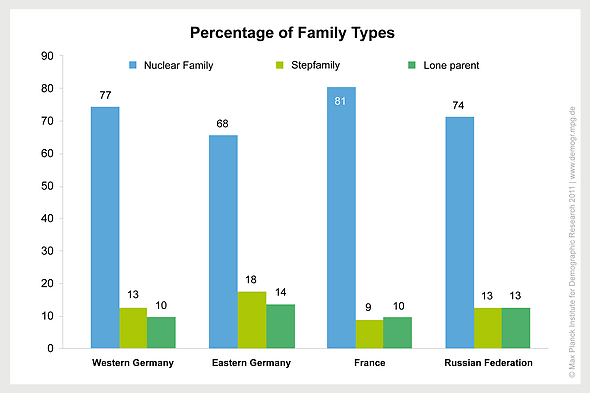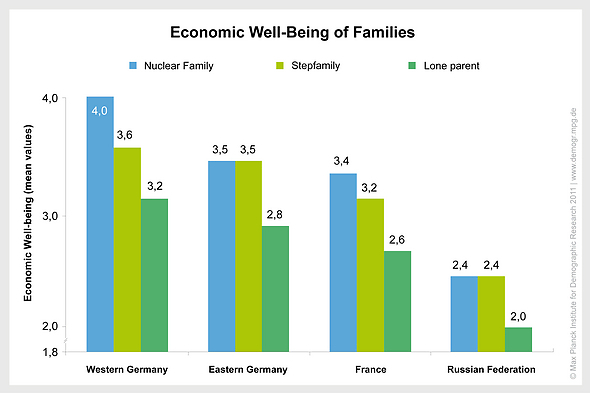January 16, 2012 | News | New Publication
Disadvantages in France and West Germany, but not in the East
In France and West Germany, stepfamilies have a harder time making ends meet than parents who live with their common children only. In East Germany and in the Russian Federation, there is no difference between these family types. In France, this disadvantage can be explained by the greater number of children in stepfamilies. In West Germany, however, the former child support law could be the reason for the gap.
(The following text is based on the original article Economic conditions of stepfamilies from a cross-national perspective by MPIDR researcher Michaela Kreyenfeld and has also been published in the issue 04/2011 of the demographic quarterly Demografische Forschung aus Erster Hand.)
In addition, the new study conducted by scientists at the Max Planck Institute for Demographic Research (MPIDR) in Rostock, in cooperation with the German Youth Institute, shows that the proportion of families that are stepfamilies is 13% in West Germany and 18% (see Fig. 1) in East Germany. The higher diffusion in East Germany was anticipated, as a greater number of single parents and couples in non-marital unions, who are more likely to separate than married couples, live there. Researchers expected to find significantly fewer stepfamilies in West Germany, as traditional notions about the family tend to prevail there, and surveys from around the turn of the millenium showed that the share of stepfamilies in West Germany was only around 5%.

Fig 1: Percentage of family types (rounded values, Source: Generations and Gender Survey 2004/2005).
Reliable official figures on stepfamilies will not be available in the foreseeable future in Germany, because these data are not collected in sufficient detail in the microcensus, the large official household survey, or the current census. The authors of the MPIDR study therefore used data from the Generations and Gender Survey (GGS) from the years 2004 and 2005 for France, Germany, and the Russian Federation. Among the roughly 10,000 families surveyed were couples who lived with their common children only, and are referred to as nuclear families. To be counted as a stepfamily, at least one child living in the househould must have come from a previous partnership. Whether the couples were married was not taken into account.
Based on the information the families provided, the study found that West German families in general have the fewest economic problems (see Fig. 2). The average nuclear family in West Germany even said they find it relatively easy to make ends meet. However, at 10%, the economic gap between nuclear and stepfamilies was revealed to be greater in West Germany than anywhere else. In France, the average stepfamily reported a financial status that is around 6% lower than that of the average nuclear family; while in East Germany and the Russian Federation, no economic differences were found between the two family types. In all of the countries studied, single parents were shown to be clearly disadvantaged.

Fig. 2: Economic well-being. Mean values of self-assessment, responding to the question “Considering the total income of your household, how easily can you make ends meet?”; with the following response options: 1: with great difficulty, 2: with difficulty, 3: with some difficulty, 4: fairly easily, 5: easily, 6: very easily (Source: Generations and Gender Survey 2004/2005).
Why do stepfamilies lag behind nuclear families in France and West Germany? In France, the socioeconomic differences between the family types were found to be the decisive factor: stepfamilies there tend to do worse financially because they have considerably more children to take care of than nuclear families (an average of 3.19, compared to 2.23 children). In West Germany, by contrast, neither family size (stepfamilies have an average of 2.25 and nuclear families have an average of 2.01 children) nor other socioeconomic factors, such as education or unemployment, were shown to be responsible for the disadvantage.
The difference may be attributable to the generous child support payments that fathers in West Germany were still responsible for in 2005: when a married couple separated, many of the male partners had to pay for their biological children, and thus had less money for their new family. By contrast, in the East, where step- and nuclear families are equally situated, child support payments after the breakup of a marriage have never played a large role. Whether these differences will remain following the recent reform of the child support law is an important question for future research.